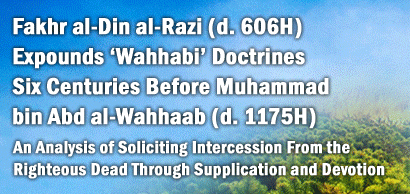 |
You are here:
Home  Monotheism
Monotheism
From Shaykh Muhammad Bin Abd Al-Wahhab's Statements on Belief in Intercession
Posted by Abu.Iyaad, Editor in Monotheism
|
 |
In an earlier article we documented the statement of the son of Shaykh Muhammad bin Abd al-Wahhaab, Abd Allaah, on intercession (shafaa'ah). Here we will reproduce a statement from the many abundant statements of Shaykh Muhammad bin Abd al-Wahhaab regarding intercession for the record (and this will be one of many more inshaa'Allaah) so as to give the reader something by which to judge what the Shaykh is upon from his own words instead of reading lies and fabrications from the opposers. Whilst this might seem repetitive it is a necessary step to take to make sure we have a variety of different statements from him, from his various works, treatises and letters which can be made the actual reference point of any discussion of his views. In al-Durar al-Saniyyah (1/31) there occurs, as part of a longer statement on his creed in general, the following:
وأومن بشفاعة النبي صلى الله عليه وسلم وأنه أول شافع، وأول مشفّع ؛ ولا ينكر شفاعة النبي صلى الله عليه وسلم إلا أهل البدع والضلال ؛ ولكنها لا تكون إلا من بعد الأذن والرضى، كما قال تعالى : ( ولا يشفعون إلا لمن ارتضى ) ، وقال تعالى : ( من ذا الذي يشفع عنده إلا بإذنه ) وقال تعالى : ( وكم من ملك في السموات لا تغني شفاعتهم شيئاً إلا من بعد أن يأذن الله لمن يشاء ويرضى ) وهو : لا يرضى إلا التوحيد ؛ ولا يأذن إلا لأهله وأما المشركون : فليس لهم من الشفاعة نصيب ؛ كما قال تعالى : فما تنفعهم شفاعة الشافعين
 ... I believe in the intercession of the Prophet (sallallaahu alayhi wasallam) and that he will be the first intercessor and the first whose intercession will be granted. No one rejects the intercession of the Prophet (sallallaahu alayhi wasallam) except the people of innovation and misguidance. However, (alongside affirmation of it), it does not take place except after [Allaah's] permission and [His] pleasure, just as He, the Exalted said, "They will not intercede except for the one with whom He is pleased" (21:28), And He, the Exalted said, "Who will intercede with Him but by His permission" (2:255), and He, the Exalted, said, "And how many an Angel is there in the heaven whose intercession will not avail of anything except after He has given permission to whomever He wills and with whom He is pleased" (53:26). And He is not pleased except with Tawhid and He does not grant permission except for it's adherents [adherents to Tawhid]. But as for the pagans, they do not have any share of intercession, just as He, the Exalted said, "Then no intercession of the intercessors will avail them" (74:28). ... I believe in the intercession of the Prophet (sallallaahu alayhi wasallam) and that he will be the first intercessor and the first whose intercession will be granted. No one rejects the intercession of the Prophet (sallallaahu alayhi wasallam) except the people of innovation and misguidance. However, (alongside affirmation of it), it does not take place except after [Allaah's] permission and [His] pleasure, just as He, the Exalted said, "They will not intercede except for the one with whom He is pleased" (21:28), And He, the Exalted said, "Who will intercede with Him but by His permission" (2:255), and He, the Exalted, said, "And how many an Angel is there in the heaven whose intercession will not avail of anything except after He has given permission to whomever He wills and with whom He is pleased" (53:26). And He is not pleased except with Tawhid and He does not grant permission except for it's adherents [adherents to Tawhid]. But as for the pagans, they do not have any share of intercession, just as He, the Exalted said, "Then no intercession of the intercessors will avail them" (74:28).
Compare the above with what is below:
Fakhr al-Din al-Razi on Soliciting Intercession, Supplication (Du'a) as the Essence of Worship, and Veneration of the Graves as a Means of Worshipping the Righteous Dead
Al-Razi said in his tafsir (Mafaateeh al-Ghayb, 17/63):
ونظيره في هذا الزمان اشتغال كثير من الخلق بتعظيم قبور الأكابر على اعتقاد أنهم إذا عظموا قبورهم فانهم يكونون شفعاء لهم عند الله
 And the equivalent of this in our time is the occupation of many of the creation with the veneration of the graves of the senior [righteous] ones, upon the belief that when they venerate their graves, then they (the deceased) will become intercessors for them with Allaah. And the equivalent of this in our time is the occupation of many of the creation with the veneration of the graves of the senior [righteous] ones, upon the belief that when they venerate their graves, then they (the deceased) will become intercessors for them with Allaah.
Al-Razi, the Ash'ari scholar of the 6th and early 7th centuries, affirmed: a) That Shafaa'ah (intercession) belongs to none but Allaah alone, and intercession can never take place except with Allah's permission - (see this article), b) That du'a (supplication) is the loftiest of the stations of al-ubudiyyah (servitude, worship), is the most excellent of the types of worship, and the reality of du'a is such that incorporates other forms of worship such as humility (dhull), servitude (uboodiyyah), incapacity (inkisaar), poverty, need (maskanah) - (see this article), c) That none of the pagans ever intended to worship the statues or idols, rather the acts of worship they performed were directed to those in the graves, and their reason was that they were intending to solicit their intercession - (see this article and this article), d) That many were found in the time of al-Razi who flocked to the graves and venerated them with the desire of soliciting the intercession of the righteous dead - (see here), e) That no nation in history ever believed in Ruboobiyyah for other than Allaah (with an exception for the Dualists) and that none of those who worship other than Allaah believe that what they worship has any independent power or control. And that what actually led people to worship things were certain philosophical and other reasons and from them were the soliciting of the intercession of the pious, righteous dead. And further, that whatever they took as focal points of worship (pictures, idols, statues, graves, tombs) were never intended for worship at all, rather they were simply focal points to allow the direction of worship to the righteous dead - (see here), f) Finally, that seeking intercession from other than Allaah is something which deprives a person from receiving intercession at all (see here).
A key thing to note in the above is al-Razi's clear and explicit denial that those worshipping others besides Allaah ever believed that those others have control over creation, life, death, benefit, harm, and he says that this (affirming another as creator, provider, sustainer) has never ever been known in any nation in history (except for the Dualists). This undermines the claims of the fabricating, slandering saint-worshippers who came later such as Ahmad Dahlan in the 13th century hijrah who claimed that Rububiyyah and Uluhiyyah are one and the same, and that distinguishing between them is an innovation! What a brazen fraud and lie against the Book of Allah, who said, (وَمَا يُؤْمِنُ أَكْثَرُهُمْ بِاللّهِ إِلاَّ وَهُم مُّشْرِكُونَ), "And most of them do not believe in Allaah except while they associate partners with Him." (12:106)
Link to this article: Show:
HTML Link •
Full Link •
Short Link
Share or Bookmark this page: You will need to have an account with the selected service in order to post links or bookmark this page.







|
|
|
Add a Comment
You must be registered and logged in to comment.
|
 |




|
 |
 Monotheism
Monotheism



 ... I believe in the intercession of the Prophet (sallallaahu alayhi wasallam) and that he will be the first intercessor and the first whose intercession will be granted. No one rejects the intercession of the Prophet (sallallaahu alayhi wasallam) except the people of innovation and misguidance. However, (alongside affirmation of it), it does not take place except after [Allaah's] permission and [His] pleasure, just as He, the Exalted said, "They will not intercede except for the one with whom He is pleased" (21:28), And He, the Exalted said, "Who will intercede with Him but by His permission" (2:255), and He, the Exalted, said, "And how many an Angel is there in the heaven whose intercession will not avail of anything except after He has given permission to whomever He wills and with whom He is pleased" (53:26). And He is not pleased except with Tawhid and He does not grant permission except for it's adherents [adherents to Tawhid]. But as for the pagans, they do not have any share of intercession, just as He, the Exalted said, "Then no intercession of the intercessors will avail them" (74:28).
... I believe in the intercession of the Prophet (sallallaahu alayhi wasallam) and that he will be the first intercessor and the first whose intercession will be granted. No one rejects the intercession of the Prophet (sallallaahu alayhi wasallam) except the people of innovation and misguidance. However, (alongside affirmation of it), it does not take place except after [Allaah's] permission and [His] pleasure, just as He, the Exalted said, "They will not intercede except for the one with whom He is pleased" (21:28), And He, the Exalted said, "Who will intercede with Him but by His permission" (2:255), and He, the Exalted, said, "And how many an Angel is there in the heaven whose intercession will not avail of anything except after He has given permission to whomever He wills and with whom He is pleased" (53:26). And He is not pleased except with Tawhid and He does not grant permission except for it's adherents [adherents to Tawhid]. But as for the pagans, they do not have any share of intercession, just as He, the Exalted said, "Then no intercession of the intercessors will avail them" (74:28). 








